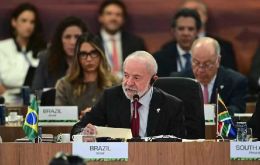MercoPress. South Atlantic News Agency
Tag: International Monetary Fund, IMF
-
Wednesday, July 23rd 2025 - 09:35 UTC
Gopinath leaves IMF to return to Harvard

International Monetary Fund Deputy Managing Director Gita Gopinath announced this week that she will be resigning from her position at the end of August to return to teaching at Harvard University. “I have decided to return to my academic roots,” she explained.
-
Monday, July 7th 2025 - 09:30 UTC
IMF and WB “a reversed Marshall Plan” says Lula

Brazilian President Luiz Inácio Lula da Silva Sunday criticized the role of the International Monetary Fund (IMF) and the World Bank (WB) because they represent “a reverse Marshall Plan, in which emerging and developing economies finance the more developed world.”
-
Thursday, April 24th 2025 - 18:31 UTC
Argentina's economic reform, an example to the world

International Monetary Fund (IMF) Managing Director Kristalina Georgieva expressed once again her support for Argentina's economic policies following an encounter with Argentine Economy Minister Luis Toto Caputo during the IMF and World Bank Spring Meetings in Washington.
-
Sunday, February 9th 2025 - 19:28 UTC
BoE chair fears “fragmentation of world economy” if Trump abandons IMF and World Bank

The Governor of the Bank of England Andres Bailey has urged continued US support for two major global economic institutions. According to a piece published by BBC, Mr. Bailey said he was “following extremely closely” whether the Trump administration would change its support for the International Monetary Fund (IMF) and the World Bank.
-
Tuesday, February 4th 2025 - 13:25 UTC
IMF tips inaccurate, Bolivia says

The Government of Bolivia stressed Monday that the International Monetary Fund's (IMF) devaluation and fiscal adjustment proposals were missing the target because they hinged on old data.
-
Thursday, January 30th 2025 - 13:28 UTC
BOFA report predicts relative stability in Argentina until mid-term elections

A Bank of America (BOFA) report released this week forecast that Argentina's Libertarian administration of President Javier Milei would be lifting the so-called exchange rate stocks in December this year. By that time, the rate was projected to stand at AR$ 1,400 = US$ 1. The study also deemed a US$ 20 billion from the International Monetary Fund (IMF) plausible, to endorse Milei's “chainsaw” State spending cuts policies amid greater exchange rate flexibility.
-
Wednesday, January 29th 2025 - 10:39 UTC
IMF mission leaves Buenos Aires but talks will continue

The International Monetary Fund's (IMF) team rounded up its mission to Buenos Aires Monday saying that negotiations for a new loan will continue. IMF Managing Director Kristalina Georgieva's envoys held meetings with Economy Minister Luis Toto Caputo and other high-ranking officials from the libertarian administration, after which they reckoned that some progress had been made.
-
Monday, January 20th 2025 - 07:12 UTC
Milei holds positive meeting with Georgieva

Argentine President Javier Milei and International Monetary Fund (IMF) Managing Director Kristalina Georgieva held a meeting Sunday in Washington DC ahead of Donald Trump's inauguration to discuss the economic situation in the South American country.
-
Monday, January 13th 2025 - 06:44 UTC
IMF warns Milei about increasing poverty amid exchange rate controls

Despite approving Argentine President Javier Milei's management in a broad way, the International Monetary Fund suggested the South American country should pay more attention to exchange rate arrears and the increasing poverty.
-
Friday, December 27th 2024 - 10:07 UTC
IMF approves US$245 million disbursement for Paraguay

After concluding the fourth review of the Policy Coordination Instrument (PCI) with Paraguay as well as the second one on the Resilience and Sustainability Facility (SRS), the International Monetary Fund (IMF) approved a disbursement of US$186.28 million in Special Drawing Rights (SDRs) representing nearly US$ 245 million to help the South American country's green energy matrix expansion.
